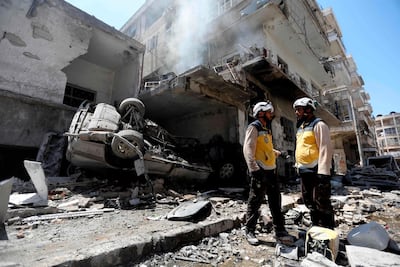Air strikes in Idlib by the Syrian regime and its Russian backer amount to a scorched-earth policy, a top UN official said on Tuesday, accusing world leaders of ignoring attacks on civilian targets.
The remarks came days after a photograph of a three-year-old girl clinging to her smaller sister's t-shirt in the rubble of a bombed-out building went viral and highlighted the plight of people stranded in the north-west province.
In remarks that reiterated repeated briefings that Idlib has become a catastrophe, Mark Lowcock, the UN's coordinator of humanitarian affairs, said the same town where the three-year-old later died of her wounds was still being bombed days later.
“You in this Security Council have ignored all the previous pleas you have heard,” he said in New York. “You know what is happening and you have done nothing for 90 days as the carnage continues in front of your eyes.
“Are you again going to shrug your shoulders, as Michelle Bachelet said. Or are you going to listen to the children of Idlib and do something about it?”
Ms Bachelet, the UN's High Commissioner for Human Rights, last week said at least 450 civilians had been killed since the forces of Syrian President Bashar Al Assad and Russia began their offensive in Idlib in April. Their stated military aim is to defeat rebels, the main group being the Al-Qaeda-affiliated Hayat Tahrir Al Sham group, but air strikes have hit hospitals, schools and other civilian sites.
Analysis of time-stamped satellite imagery gathered over the past three months shows that at least 17 villages have been completely destroyed, Mr Lowcock said.
“What you see is a level of destruction consistent with a bombing campaign aimed at a scorched-earth policy,” he said, referring to Kafr Nabutha, a town in southern Idlib where buildings have been flattened.

Information received about air attacks will be passed on to the Commission of Inquiry for Syria, which is gathering and preserving evidence for potential war crimes charges committed over the more than eight-year war, Mr Lowcock told the council.
Britain's permanent representative to the UN, Karen Pierce, said a recent letter from the Syrian ambassador to the UN, which admitted at least one hospital had been deliberately targeted, was confirmation that war crimes were being committed.
“What is happening in Idlib makes a mockery of permanent state responsibilities,” she said in reference to Russia and its ability to veto any collective action by the council.
Syrian and Russian units who are proven to have bombed civilian sites will eventually be subject to international charges, Ms Pierce insisted, despite the diplomatic stalemate.

Interviewed about Idlib and the council's inaction, she earlier told BBC's Radio 4 Today programme: "We actually need the Russians to get to the same sort position they did in the 1990s on Bosnia, where in the face of such awful humanitarian situations on the ground, and indeed crimes against humanity and worse, the Russians agreed with us in the Security Council.
“We’ve got to keep trying for the sake of the people in Idlib, no matter how unsatisfactory, and no matter how cynical the Syrian and Russian reply is.”







